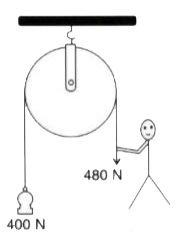A boy uses a single fixed pulley to lift a load of 50 kgf to some height. Another boy uses a single movable pulley to lift the same load to the same height. Compare the effort applied by them. Give a reason to support your answer.
To solve the problem, we need to determine the effort applied by both boys when lifting the same load using different types of pulleys.
Step 1: Understand the types of pulleys
- A fixed pulley changes the direction of the force applied but does not reduce the amount of effort needed to lift the load.
- A movable pulley reduces the amount of effort required to lift the load by distributing the weight.
Step 2: Calculate the effort for the fixed pulley
- The mechanical advantage (MA) of a fixed pulley is 1.
- The formula for mechanical advantage is:
MA=LoadEffort
- Given that the load (W) is 50 kgf, we can substitute the values into the formula:
1=50 kgfEffort
- Rearranging the formula to find the effort:
Effort=50 kgf
Step 3: Calculate the effort for the movable pulley
- The mechanical advantage (MA) of a movable pulley is 2.
- Using the same formula for mechanical advantage:
2=50 kgfEffort
- Rearranging to find the effort:
Effort=50 kgf2=25 kgf
Step 4: Compare the efforts
- The effort applied by the boy using the fixed pulley is 50 kgf.
- The effort applied by the boy using the movable pulley is 25 kgf.
- Therefore, the ratio of the effort applied by the two boys is:
Ratio=50 kgf25 kgf=2:1
Conclusion
- The boy using the fixed pulley exerts 50 kgf of effort, while the boy using the movable pulley exerts 25 kgf of effort. Thus, the effort applied by the boy with the fixed pulley is twice that of the boy with the movable pulley.
- A fixed pulley changes the direction of the force applied but does not reduce the amount of effort needed to lift the load.
- A movable pulley reduces the amount of effort required to lift the load by distributing the weight.
- The mechanical advantage (MA) of a fixed pulley is 1.
- The formula for mechanical advantage is:
MA=LoadEffort
- Given that the load (W) is 50 kgf, we can substitute the values into the formula:
1=50 kgfEffort
- Rearranging the formula to find the effort:
Effort=50 kgf
- The mechanical advantage (MA) of a movable pulley is 2.
- Using the same formula for mechanical advantage:
2=50 kgfEffort
- Rearranging to find the effort:
Effort=50 kgf2=25 kgf
- The effort applied by the boy using the fixed pulley is 50 kgf.
- The effort applied by the boy using the movable pulley is 25 kgf.
- Therefore, the ratio of the effort applied by the two boys is:
Ratio=50 kgf25 kgf=2:1
- The boy using the fixed pulley exerts 50 kgf of effort, while the boy using the movable pulley exerts 25 kgf of effort. Thus, the effort applied by the boy with the fixed pulley is twice that of the boy with the movable pulley.
Topper's Solved these Questions
Similar Questions
Knowledge Check
A boy uses a single fixed pulley while a girl uses a single movable pulley to draw water from a well. Who has worked efficiently?
ABoyBGirlCbothDnone of the aboveA pulley is used to lift a load of 180kgf by applying an effort of 90kgf in the downward direction. Calculate the work done by the effort applied on the pulley.
A2JB12JC6JD24JIn a block and tackle system of pulleys the load is lifted through a height of 2m while the effort is applied for 6m. Hence the velocity ratio of this system is
A2B3C6D12

Although the effort in using a pulley is the same as the load, what is the benefit of using a pulley ?
View SolutionA boy uses blue colour of light to find the refractive index of glass. He then repeats the experiment using red colour of light. Will the refractive index be the same or different in the two cases? Give a reason to support your answer.
View SolutionA pulley system with a velocity ratio of 4 is used to lift a load of 150 kgf through a vertical height of 20 m. the effort required is 50 kgf in downward direction. Calculate:
(a) the distance moved by the effort.
(b) the work done by the effort.
(c) the mechanical advantage.
(d) the efficiency of the pulley system, and
(e) the total number of pulleys and the number of pulleys in each block.
(g=10N kg−1).
View SolutionThe adjacent Figure shows a fixed pulley used by a boy to lift a load of 400 N through a vertical height of 5 m in 10 s. the effort applied by the boy on the other end of the rope is 480 N.

(a) What is the velocity ratio of the pulley ?
(b) What is the mechanical advantage ?
(c) Calculate the efficiency of the pully.
(d) Why is the efficiency of the pulley not 100% ?
(e) What is the energy gained by the load in 10 s?
(f) How much power was developed by the boy in raising the load ?
(g) The boy has to apply an effort which is greater than the load he is lifting. what is the justification for using the pulley ?
View SolutionA block and tackle system of pulleys is used to lift a load of 360kgf by applying an effort of 200kgf such that load is lifted to a height of 2m and effort is applied through a distance of 8m. Find MA and VR of the system.
View Solution
